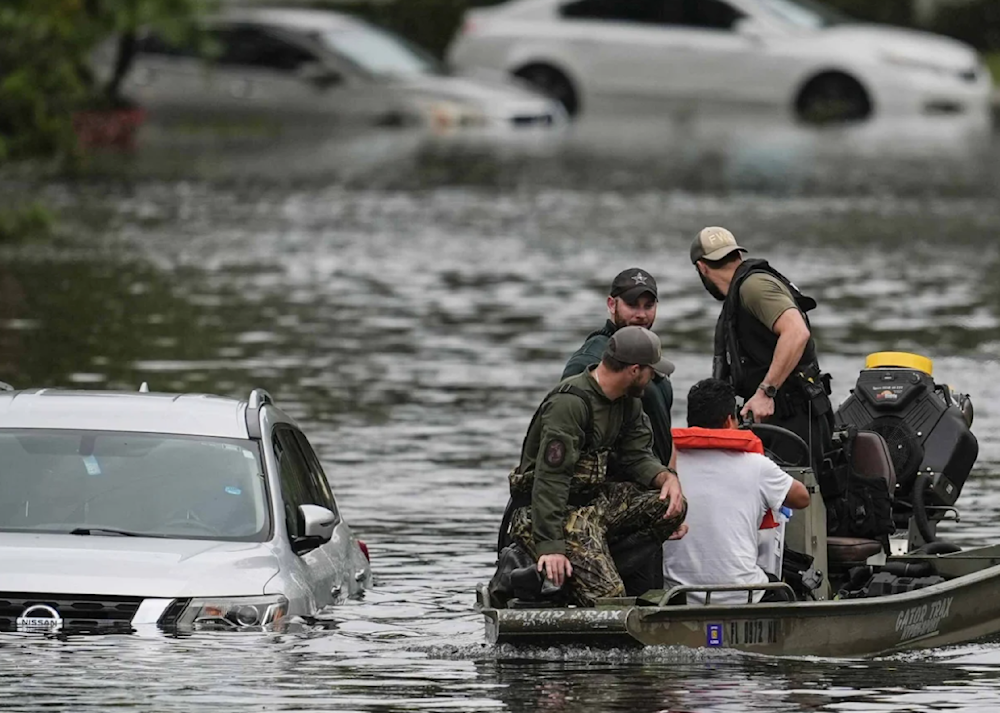Hurricanes, storms cost US $500bln in economic losses in 2024
AccuWeather chief meteorologist Jon Porter says it would take "years" for these communities, families, and small businesses to recover.
-

People are rescued from an apartment complex in the aftermath of Hurricane Milton, on October 10, 2024, in Clearwater, Florida. (AP)
Hurricanes and tropical storms that battered the United States in 2024 caused economic damages of about $500 billion, AccuWeather reported.
Experts calculated that Hurricane Beryl's economic loss and destruction to the Gulf Coast in July was between $28 billion to $32 billion. Hurricane Debby, which slammed the Carolinas hardest a month later, caused $28 billion in damage, while Hurricane Francine cost around $9 billion, according to The Hill.
Hurricanes Helene and Milton, which blew across the South in late September and October, caused the most economic damage, according to AccuWeather scientists.
Hurricane Helene, which ravaged areas of North Carolina, was believed to have caused between $225 billion and $250 billion in overall damage and economic loss, flooding houses, collapsing roads, uprooting trees, and leaving hundreds of thousands of citizens without electricity for weeks.
According to figures provided late last month by the Federal Emergency Management Agency (FEMA), individuals and households in the Tar Heel State received more than $194 million in assistance.
Hurricane Milton wreaked havoc on Florida in early October, causing between $160 billion and 180 billion in economic loss and total damage. The storm swiftly increased, sweeping through towns, demolishing homes, and flooding the streets with muck, leaving more than 3 million people without electricity at some point.
AccuWeather Chief Meteorologist Jon Porter stated that it would take "years" for these communities, families, and small businesses to recover, adding that some communities may "never fully recover from the catastrophic inland flash flooding we witnessed this year.”
The report comes after the Labor Department issued data earlier this month showing that employment growth in October halted at 12,000 positions. Some significant strikes influenced the statistics, but storms Helene and Milton also had an impact, since forecasts predicted that the country would create around 115,000 jobs.
Porter explained that there are also significant costs to health and well-being, as well as businesses and tourism.
Those who survive are exposed to hazardous floodwaters, toxic mud, and dust, as well as mold and mildew in damaged homes and apartments.
Why US foreign policy is under fire from populist Right: FPIF
An analysis published on Foreign Policy In Focus by writer Philip Balboni draws attention to the growing divide over US spending priorities in the wake of Hurricanes Helene and Milton.
The two storms, which struck the southeastern US coast with catastrophic force, left hundreds dead and caused billions in damages.
Yet, as affected communities scramble for federal assistance, Balboni's piece exposes a troubling imbalance in how Washington allocates funds—raising critical questions over the government's commitments to domestic welfare versus overseas interests.
While the Biden administration has touted its quick response, Republican leaders have sharply criticized the relief efforts, accusing the White House of shortchanging hurricane victims.
Balboni points to a stark contrast: while disaster relief funding for the affected Gulf Coast states totals just $860 million, US foreign aid last year reached $60 billion, and the defense budget exceeded $800 billion.
"Communities battered by storms are questioning why their needs are underfunded," Balboni writes, noting how foreign policy and military spending are increasingly under fire from Americans struggling at home.

 3 Min Read
3 Min Read








